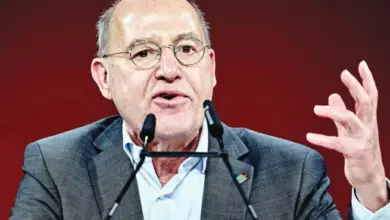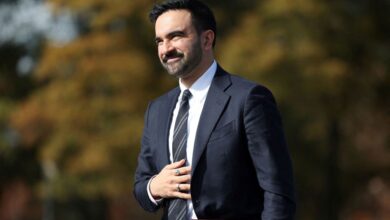
The Egyptian media scene has taken blow after blow this year; every time someone directs criticism at the government or the state, television media figures are either sacked or forced to take leave.
The state has defined a certain role for the media, and those who operate outside that role are reprimanded accordingly. Many have criticized the media scene in Egypt for not standing by its government in facing political and economic challenges.
Caught between the state and the media is the viewer, who finds himself faced with the policies and practices of the government, meanwhile dealing with media efforts to recruit him as an audience member — or speak on his behalf.
There is a third player, however, whose impact has grown larger than many people expected: social media.
Media figures now find themselves caught between a rock and a hard place. On the one hand, they could abide by the government’s guidelines regarding their reporting, but face heavy criticism on social media from the Egyptian people who label them liars. On the other hand, they could stick to the truth and face reprimands that affect their livelihoods.
Amr al-Laithy
Media figure Amr al-Laithy recently broadcast footage of a tuk-tuk driver speaking energetically about the state of education, healthcare and inflation. The driver shared his views in an interview on the street in 6th of October, the recording broadcast to the nation on Laithy’s show “Wahed min al-Nas”.
On numerous occasions, Laithy has conducted similar interviews with an underlying theme of heavy criticism of the government. The episode with the tuk-tuk driver attracted a massive audience, and within hours the video had gone viral on social media.
Laithy was accused by the government of not showing enough consideration for the current state of the country and the pressure the government is under, not to mention their alleged efforts to fix the delapidated state the Egypt finds itself in.
The programme and its presenter were heavily criticized on social media after the episode. Laithy was accused of getting the tuk-tuk driver to memorize all the things he said during the short interview, as well as using music and sound effects to dramatize the whole thing, a feature that is characteristic of Laithy’s show, but apparently previously unnoticed.
Others accused the driver of being affiliated with the Muslim Brotherhood, saying that the entire interview was set up, despite Laithy insisting that he met the tuk-tuk driver by chance.
Two days after the episode, Laithy’s show was taken off the air. So too was his other show on El-Hayat channel, “Bi Wodooh”. In both cases, the reason given was that he had decided to take his annual vacation, seeing as he had been putting it off. Both channels insisted that he would be back after three weeks.
Yosri Fouda
Because of direct criticisms of President Abdel Fattah al-Sisi and his government, media figure Yousri Foda’s show “Akher Kalam” was canceled in 2014. A few months ago, he began hosting a new show, called “The Fifth Estate” on Deutsche Welle Arabia, although he has a much lower viewership now. The show is broadcast from Germany and has a strong presence online, dealing mainly in issues relating to the Arab world. Fouda is finishing what he started with “Akher Kalam” before he was silenced.
Rania Badawi
After co-hosting an episode of “Kol Youm” on ONTV with celebrated media figure Amr Adib last Wednesday, multi-platform journalist, Rania Badawi’s contract with ONTV was terminated. During the episode, she directed criticism at the Investment Minister, saying she is the worst Investment Minister Egypt has ever seen, deeming her performance as a disappointment.
ONTV was subjected to an onslaught of criticism on social media, which resulted in the removal of Badawi from her job, after appearing on only one episode. The channel then said in a statement that journalistic ethics are absolute and that they carry the burden of relaying the truth and staying true to the nation, something that they consider a huge challenge.
Tawfik Okasha
Tawfiq Okasha, owner of his own television channel at the time, El-Faraeen, established himself as a strong voice for the underprivileged, calling on the masses to join the June 30 protests to overthrow the Muslim Brotherhood. He continued gaining more viewers for his show due to his loud and provocative mannerisms.
Then, in interview earlier this year, he called for early presidential elections, criticizing the rule of President Abdel Fattah al-Sisi and his cabinet. He was taken off the air and his TV channel was shut down.
Lilian Dawood
Last June, the ONTV program “El Soora El Kamla”, hosted by Lebanese media figure Lilian Dawood, was taken off the air — right after ONTV was bought by businessman Ahmed Abu Hashima. Dawood's show uncovered several cases regarding corruption in Egypt and she constantly criticized the government on her show. Her show often dealt with cases that officials found disagreeable, and they especially were not pleased with the kind of people she brought onto the show for comment.
After she was removed and deported from Egypt, she said that she had been placed under intense pressure by the government. She said she had been tried before the court of public opinion, which showed that she neither deliberately targeted the government nor intended to disrupt the peace of the nation.
She also said that she didn’t lie or unfairly judge anyone on her show, pointing out that Egypt has laws for such crimes, and that if she were taken to court, she would be proven innocent.
In one of her final episodes, she addressed the youth of Egypt, saying that they are the future, and that they should not let what is rightfully theirs be taken away from them.
She insisted that her aim was not to target anyone or overthrown anyone, but simply to bring about improvements. Outraged, she demanded, “Does this mean I am trying to overthrow the system?”
Last June, Dawood was deported from Egypt after being arrested at her residence in Zamalek on the same day that her contract with ONTV was terminated. Even though her daughter, whose father is media figure Khaled al-Barry, is an Egyptian citizen, Dawood was not allowed to stay in the country.
Maspiro: State TV Media presenters
A large number of television reporters and officials have been punished for their criticisms of the state, the government or the president in the last few months. The most recent is TV presenter George Rashad, a news anchor on Nile News. He praised ousted president Mohamed Hosni Mubarak and his prowess as a military pilot during the October 6 war and was instantly removed.
The reason for his removal was that he used the channel as a medium to express his own agenda, which may be fine on privately-owned channels but certainly not in government-owned channels.
The former head of the news sector, Mostafa Shehata, was also punished for accidentally showing a video of Sisi speaking at an old UN General Assembly session, rather than a more recent event. Athough the mix-up was the responsibility of the news coordinator, Shehata was removed from his position and replaced by Khaled Mahny.
Several other anchors were removed from their positions. Channel 3 reporter Azza al-Henawy was removed from her show “Cairo News”. Heba Ezz al-Arab from Channel 3 was also removed and her show "Thowar Li Akher Mada”.
Moataz al-Demerdash and Mona al-Shazly
Before the consequences of reporting on topics the government deems sensitive became so serious, those who offended the state would be made to report on different kinds of material, generally moving toward less political topics. Media figures who overstepped their boundaries would put up a “closed for maintenance” sign on their shows, then go back to the drawing board and come up with a new kind of show. They would put something together that didn’t lose them their audience but also stayed within the guidelines provided by the state.
One of Egypt’s most prominent media figures was Mona al-Shazly, whose show “Gomla Mofeeda” aired on MBC Masr for a few months, after she moved from the Dream TV, where she had presented her magnum opus “El Ashera Masaan” for years.
Shazly benefitted from the systematic elimination of big media figure Hamdy Kandil from every television channel in the country. Kandil tried to take his two shows “Raees al-Tahrir” and “Qalam Rosas” to TV stations elsewhere in the Arab world — the UAE and even Libya — all to no avail.
Shazly came back with a new talk show, with a new slogan: “No, politics, I don’t want your good side and I don’t want your bad side.”
Her new show hosts guests from many different fields, and while it sometimes deals with humanitarian themes, it is generally classified as entertainment rather than journalism. In one episode, she interviewed Barack Obama from inside the White House. Another time, she interviewed Al-Haga Seesa, a woman who dressed like a man for 40 years.
Similarly, Moataz al-Demerdash, also a prominent media figure in the recent past, was eliminated from El-Hayat TV, where he had presented his show “90 minutes”. He then moved to MBC Masr, where he presented his show “The Most Dangerous Man in the World”, a programme that borrowed elements from the satirical Bassem Youssef Show. The show did not succeed and his contract with MBC was not renewed, which brought him back to El-Mehwar TV, where he began his career in the 2000s.




